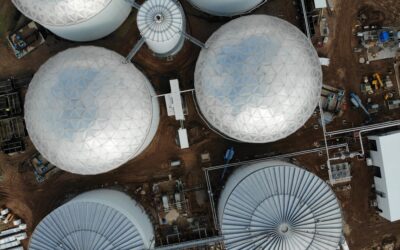Equilibrium backs Revol Greens’ plans for $110m Texas greenhouse
TEMPLE, Texas
Equilibrium plans to invest more than $110 million to back its portfolio company Revol Greens, as it expands into Texas through a four-phase construction of what it says will be the world’s largest indoor lettuce facility.
Chief executive and chairman Dave Chen told Agri Investor the investment is structured as a combination of equity and debt that will support construction of a facility that will include processing and packaging operations. He declined to disclose the terms of the debt but did say the majority of the investment is structured as equity to support construction of the 40-acre greenhouse in Temple, Texas.
The investment comes after Equilibrium identified an area of Texas between Dallas, Houston and Austin that is well-suited to development and canvassed its operating companies to gauge their interest in developing a greenhouse in the region together, Chen said.
Equilibrium has already invested in existing Revol Greens’ facilities in Minnesota and California and the Temple facility will mark the Minnesota headquartered company’s entry into Texas. Negotiations related to the project with the Bell County Commissioners Court are ongoing and plans call for construction to begin this year and for the facility to be operational in 2022.
“There are several regions and states where we have identified ideal site locations and climate locations where state economic development agendas would love to see someone like us develop an agripark,” Chen said.
A source familiar with the transaction told Agri Investor it drew from Equilibrium’s Controlled Environment Food Fund II, which has a target of $500 million and has received commitments from the Development Bank of Japan and the San Francisco Public Employees’ Retirement Association, among others.
Investments from the vehicle have included Mexican greenhouse operator Finka, US East Coast-focused Little Leaf Farms and Morehead, Kentucky headquartered AppHarvest, which listed on the Nasdaq exchange earlier this year after a SPAC merger with Novus Capital.
Chen said in addition to highlighting the importance of labor, weather and water conditions in selecting sites for greenhouse construction, the Revol Greens expansion into Texas reflects the greenhouse sector’s growing need for scale, which has rendered some smaller facilities “stranded assets.”
“We’ve been offered deal after deal of relatively successful small greenhouse operations and the economy of scale that’s necessary dictates that we’ll have to focus on scalable assets, not so much the consolidation,” he said. “The small greenhouses are being used as buffers and hedges. The large greenhouses are going to be used for foundational [supply].”
Institutional investors are increasingly interested in agricultural investments like greenhouses that Chen said are structured similarly to infrastructure investments, echoing a point made recently by the author of an industry survey that estimated US indoor expansion over the next 10 years will require as much as $20 billion in capex for leafy greens alone.
“There are multiple forms of capital that are forming around the greenhouse industry that will give the smart entrepreneur that understands corporate finance the fuel to grow,” said Chen. “Everybody’s coming for this sector.”
